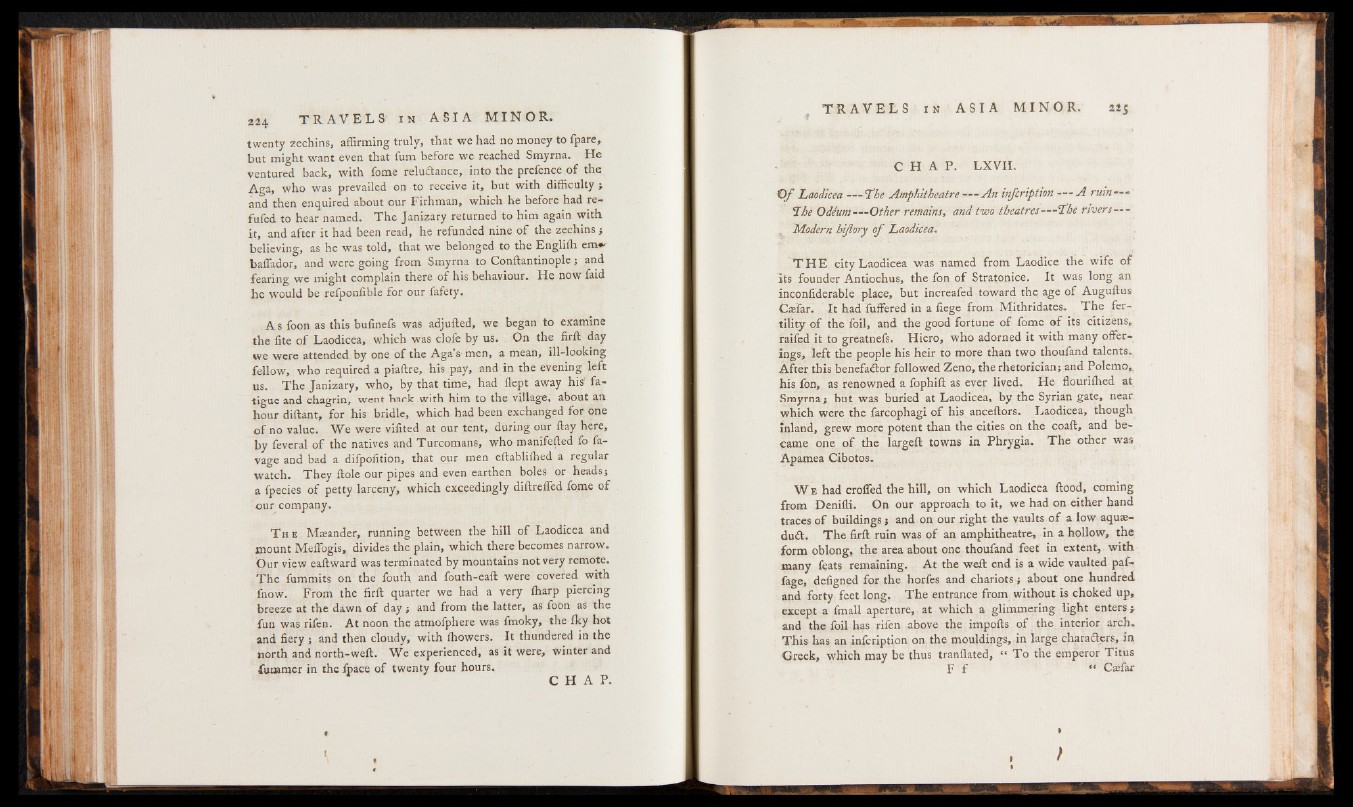
twenty zechins, affirming truly, that we had no money to fpare,
but might want even that fum before we reached Smyrna. He
ventured back, with fome reludtance, into the prefence of the
Aga, who was prevailed on to receive it, but with difficulty ;
and then enquired about our Firhman, which he before had re-
fufed to hear named. The Janizary returned to him again with
it, and after it had been read, he refunded nine of the zechins;
believing, as he was told, that we belonged to the Englilh em*'
baffador, and were going from Smyrna to Conftantinople; and
fearing we might complain there of his behaviour. He now faid
he would be refponfible for our fafety.
A s foon as this bufinefs was adjufted, we began to examine
the fite of Laodicea, which was clofe by us. On the firft day
we were attended by one of the Aga s men, a mean, ill-looking
fellow, who required a piaftre, his pay, and in the evening left
us. The Janizary, who, by that time, had flept away his' fatigue
and chagrin, went back with him to the village, about an
hour diftant, for his bridle, which had been exchanged for one
of no value. We were vifited at our tent, during our ftay here,
by feveral of the natives and Turcomans, who manifefted fo fa-
vage and bad a difpolition, that our men eftablifhed a regular
watch. They ftole our pipes and even earthen boles or heads;
a fpecies of petty larceny, which exceedingly diftrelfed fome of
our company.
T he Maeander, running between the hill of Laodicea and
mount Meffogis, divides the plain, which there becomes narrow.
Our view eaftward was terminated by mountains not very remote.
The fummits on the fouth and fouth-eaft were covered with
fnow. From .the firft quarter we had a very (harp piercing
breeze at the dawn of day ; and from the latter, as foon as the
fun was rifen. At noon the atmofphere was fmoky, the Iky hot
and fiery ; and then cloudy, with fhowers. It thundered in the
north and north-weft. We experienced, as it were, winter and
fuaamer in the ipace of twenty four hours.
C H A P . LX VII.
O f Laodicea — Lhe Amphitheatre— An infcription — A ruin—
The Odeum— Other remains, and two theatres— Lhe rivers—
. Modern hijiory o f Laodicea.
T H E city Laodicea was named from Laodice the wife of
its founder Antiochus, the fon of Stratonice. It was long an
inconfiderable place, but increafed toward the age of Auguftus
Caffar. It had fuffered in a fiege from Mithridates. The fertility
of the foil, and the good fortune of fome of its citizens,
raifed it to greatnefs. Hiero, who adorned it with many offerings,
left the people his heir to more than two thoufand talents.
After this benefadtor followed Zeno, the rhetorician; and Polemo,
his fon, as renowned a fophift as ever lived. He fiourilhed at
Smyrna; but was buried at Laodicea, by the Syrian gate, near
which were the farcophagi of his anceftors. Laodicea, though
inland, grew more potent than the cities oh the coaft, and became
one of the largeft towns in Phrygia. The other was
Apamea Cibotos.
W e had crofted the hill, on which Laodicea flood, coming
from Denifli. On our approach to it, we had on either hand
traces of buildings ; and on our right the vaults of a low aquas-
dudt. The firft ruin was of an amphitheatre, in a hollow, the
form oblong, the area about one thoufand feet in extent, with
many feats remaining. At the weft end is a wide vaulted paf-
fage, defigned for the horfes and chariots; about one hundred
and forty feet long. The entrance from without is choked up,
except a fmall aperture, at which a glimmering light enters;-
and the foil has rifen above the impofts of the interior arch.
This has an infcription on the mouldings, in large characters, in
Greek, which may be thus tranflated, “ To the emperor Titus
F f “ Csfar
1